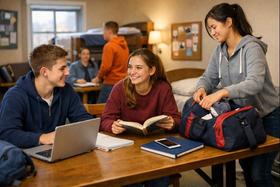Boarding or residential schools occupy a unique niche in the K-12educational world. Here are some facts to help you understand how these schools work and who they serve.
1. There are over 300 boarding schools in the U.S.
Most boarding schools prepare their students for college-level work. Hence the name "college prep" or "prep," which you will see in many school names. Most boarding schools are coeducational. But there are about a hundred schools that are single-sex schools. They accept and teach only boys or girls.
There are several types of boarding schools. Alternative and therapeutic schools serve specific needs, such as emotional and disciplinary issues. Still, other schools offer programs for students with special needs such as dyslexia, ADD/ADHD, and other learning differences. They have the skilled, highly credentialed staff to ensure the best possible outcome for your child. They focus on college preparation as well. Military schools combine academics and the military training many young people and their parents demand. As you review the boarding school profiles on this site, you will discover that there is a school for every need and requirement.
Boarding schools today are poles apart from their stereotypical Hollywood images, as havens for children of privilege or refuges for troubled teens. Research proves that contemporary boarding schools serve a diverse body of motivated students who study and live in supportive, inclusive academic communities where they learn about independence and responsibility – values that help them achieve success at higher rates than private day and public school students – in the classroom and beyond. Source: The Association of Boarding Schools
2. Some schools are purely residential.
Other schools are a mix of boarding and day students. A true boarding school has most of its students resident on campus. However, if a school happens to be located in a town or other major population area, it could have a significant percentage of day students. There's nothing intrinsically wrong with that, but it does change the complexion of the school and its life. Why? Because the day students leave is at the end of the academic day. While they will come back for sports and extracurricular activities, they are off-campus evenings and weekends.
3. All schools choose their own curricula.
The state where a school is located will have legislated minimum requirements for curriculum content, which every school must meet or exceed. 99% of boarding schools exceed those minimum requirements. There are several flavors of academics to be found in boarding schools.
This video offers an overview of the Harkness method of teaching.
The broad categories are traditional and progressive. Traditional schools offer test-based curricula, including the popular Advanced Placement curriculum and, in a handful of schools, the International Baccalaureate program. Progressive schools don't believe in tests as a rule. Students are prepared for college-level work, of course, but the approach is student-centered instead of the traditional teacher-centered approach to learning.
4. Most schools are staffed with well-qualified teachers.
Peruse boarding school profiles on this site and look for the percentage of teachers with advanced degrees. The numbers are usually quite high. Why? Because schools demand the high-quality teaching that your child receives. Teachers with advanced degrees typically have a wealth of experience and knowledge in their subject area and the art of teaching.
This video offers an overview of Missouri Military Academy, Mexico, Missouri.
5. Most schools offer tuition discounts for siblings.
Most boarding schools will give you a discount if you have more than one child attending the school. They will also generally give you a discount for cash tuition payments. Tuition bills are rendered twice a year. Paying them in two payments will result in savings. See your financial consultant for advice on how to take advantage of the discounts available to you.
Schools offer generous financial aid programs. While the programs vary from school to school, always ask about financial aid.
6. Most schools have extensive athletic facilities.
Sports is not an add-on or an extra at a boarding school. It is an integral part of the program every boarding school offers. Some schools have more and better athletic facilities than others. But the point is that every student is required to participate in sports. Most schools set aside one afternoon a week for sports. Saturdays are major sports days as well. Depending on what part of the country you are in, the sports lineup will include everything from hockey to crew. Participation is at various skill and competitive levels, and intramural and varsity sports are hugely popular. As a result, you will find indoor track and field facilities, natatoria, basketball, squash, and badminton courts, golf courses, equestrian facilities, soccer and field hockey fields, hockey rinks, rowing facilities, and much more.
Many schools offer equestrian programs. An equestrian program takes significant amounts of money to operate. However, it is one of the features that distinguishes boarding schools from day schools, public and private. Most schools with equestrian programs offer the opportunity for your child to board her horse, too. While English-style riding tends to dominate the sport, Western riding programs can be found at several schools. Lest anybody criticizes riding as an elitist sport, remember that horses have been a part of American culture and history since the beginning of civilization on this continent.
7. Boarding schools offer a family atmosphere.
Read the information on boarding school websites. Visit the schools. One common aspect of boarding schools quickly becomes apparent. They all pride themselves on offering a warm, family atmosphere. How do they do that? They break the student population into smaller, more intimate groups by having the students live in dormitories. Each dorm has a resident faculty supervisor or master living down the hall from where your child lives. The socialization and relationship fostering continue with family-style meals and relaxing times in the standard room. Many schools also use a house system that groups students across grade and age levels. Houses compete internally and with each other for all kinds of things. They engage in activities and projects that will build bonds and team spirit.
8. Boarding schools offer 24/7 supervision.
Safety is a prime concern of every boarding school. That's because your child is at school 24/7. Schools operate legally in loco parentis or your place as the student's parents. As a result, schools make it their business to know where your child is at all times. If that sounds slightly like a stifling prison atmosphere, it isn't. It means she cannot disappear for hours without somebody knowing where or what she is doing. Will teens get into mischief and push the limits at a boarding school? Of course, they will. However, they also understand that there are consequences for unacceptable behavior. That is all part of the contract you sign with the school. A code of conduct holds a school community together and allows it to function smoothly and benefit all community members.
9. Boarding schools offer sports/academics/extracurriculars in one convenient package.
Any parent who has had to drive a child around town to all the various sports and extracurricular activities she wants to be involved with understands the advantage a residential school offers. Everything is self-contained and in one place. Best of all, a busy professional parent doesn't have to worry about being a taxi service 6 days a week driving her children all over town.
10. American boarding schools welcome international students.
The standard of education is high. The opportunity to learn English as a second language and to immerse oneself in American culture is a huge draw for many overseas families. American boarding schools also appeal because they provide solid academic preparation for college and university work. While the United Kingdom has more boarding schools, most American boarding schools offer a mix of academics, sports, and extracurricular activities that parents and students from other countries find most compatible with their objectives.
Questions? Contact us on Facebook. @boardingschoolreview















